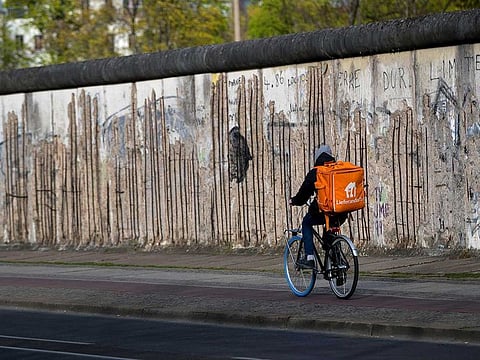German COVID-19 cases ‘stable’ as leaders mull easing lockdown
Chancellor Merkel to hold conference with state premiers on coronavirus control measures

Frankfurt Am Main: The number of people infected with coronavirus in Germany has “stabilised”, the public health chief said Tuesday, as politicians prepare for talks on when to end the lockdown measures used to slow the disease’s spread.
“Numbers have stabilised at a relatively high level,” Lothar Wieler of the Robert Koch Institute (RKI) for disease control told reporters.
“There is no clear sign at present that they’re falling,” he added.
Politicians are waiting on every comment by the country’s leading medical experts, as Chancellor Angela Merkel will hold a conference Wednesday with state premiers on whether and for how long to extend infection control measures.
At present, they are slated to expire on April 19.
“We should keep up our discipline from the past weeks,” Wieler urged Tuesday, noting that while the trend on new infections was heading in a “positive” direction, it was not yet possible to say that the disease has been contained.
By midnight, 125,098 people in Europe’s most populous country had tested positive for coronavirus, according to RKI data.
More than half - around 68,000 - went on to recover, while almost 3,000 have died.
Strict social distancing measures, including closures of schools and many businesses, have helped slow the virus’ spread in Germany, while extensive testing has caught many cases early.
“Given the present momentum, there is no forecast of shortfalls” in the number of intensive care beds in German hospitals to treat critically ill COVID-19 patients, Wieler said.
“Compared with many other countries, we’re doing well”.
‘No right or wrong’
Even as Wieler called for infection control measures to be upheld, debate has begun about when everyday life can begin inching back towards normality.
Eyes have turned to neighbouring Austria, where Chancellor Sebastian Kurz allowed many smaller businesses to reopen from Tuesday - but with conditions such as wearing masks and maintaining a safe distance from others.
Germany’s Leopoldina national science academy published on Monday a paper outlining the first lockdown exit steps that could be implemented, including a gradual reopening of schools, obligatory mask-wearing in public transport and increased data gathering.
Recommendations from the 26-strong group of scientists will inform Merkel’s Wednesday conference.
Berlin mayor Michael Mueller told broadcaster RBB Tuesday the lockdowns could be relaxed “at the earliest from April 27, or possibly from May 1”.
But “it probably won’t be this coming Monday”, the day after the measures are currently set to expire, Mueller added.
RKI chief Wieler said there were “no major differences” between his view of the situation and the Leopoldina’s, beyond “small details” such as which age groups should return to school first.
“There is still no blueprint” for how to reopen a society and economy after the virus lockdown, he added, and “not always a right and wrong” answer.



